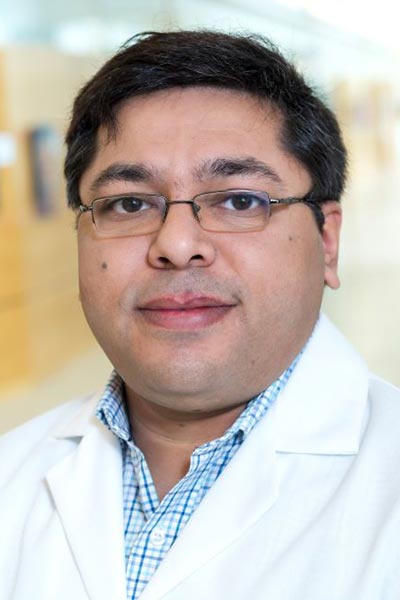Yash Chhabra, PhD
Spotlight on the AACR NextGen Stars Class of 2025
Since 2014, the American Association for Cancer Research (AACR) has provided the opportunity for graduate students, postdocs, and assistant professors to give high-profile presentations at the AACR Annual Meeting as part of its NextGen Stars Program. This year, 11 early-career researchers were selected based on their outstanding applications.
Learn more about one of the newest NextGen Stars below, and check out the Q&As with other members of the NextGen Stars Class of 2025.
Yash Chhabra, PhD
AACR NextGen Stars Class of 2025
Assistant Professor
Fox Chase Cancer Center, Philadelphia, Pennsylvania
Abstract Presentation:
Harnessing age- and sex-differential changes within the tumor microenvironment to inhibit metastasis and promote therapy responses in melanoma
Session Details:
SY03 – From Cells to Systems: Unraveling the Heterogeneity of Stress-Induced Senescence in Cancer
Wednesday, April 30, 10:15-11:45 a.m. CT
Room S102, McCormick Place South (Level 1)
What is the subject of your research?
My research focuses on understanding how age- and sex-dependent changes both at the systemic level as well as within the tumor microenvironment influence nonreproductive solid cancers. We use melanoma as the primary cancer model for our investigation. The aim is to determine vulnerabilities and codependencies in the tumor molecular circuitry that drives differences in melanoma progression, metastasis, therapy responses as well as resistance. We hope to uncover novel therapeutic strategies that can improve treatment outcomes in elderly patients, the most vulnerable patient cohort.
What sparked your interest in this area of research, and why is it important?
My interest in this field was sparked by the stark underrepresentation of elderly patients in melanoma clinical trials and the limited understanding of sex-based differences in cancer progression. Recognizing these critical gaps in research motivated me to explore how aging and sex influence the tumor microenvironment and, ultimately, melanoma outcomes. During my doctoral training in Australia, I studied growth hormone, a key endocrine regulator with distinct sex-dimorphic effects. This foundation in endocrinology, combined with my postdoctoral training in melanocytic and melanoma biology in Australia and later in the aging tumor microenvironment in the United States, provided me with a unique perspective on the critical influence of aging and sex on cancer progression.
Aging is one of the most significant yet often overlooked risk factors for melanoma. However, most studies rely on young preclinical models of singular sex that fail to capture the molecular and physiological changes occurring in older patients across both biological sexes. With life expectancy increasing—but not necessarily health span—there is an urgent need to develop therapeutic strategies that account for both age- and sex-specific differences in cancer treatment. Given that the aging population is expected to double by 2050, addressing these disparities is crucial to alleviating the public health burden. My research aims to bridge this gap by identifying the molecular drivers of these disparities, ultimately paving the way for more personalized and effective treatment approaches that improve outcomes for all patients.
What (or who) inspired you to apply for the NextGen Stars program?
I applied for the NextGen Stars program because I believe that scientific progress thrives on collaboration, mentorship, and the exchange of ideas. Throughout my research journey, I’ve been fortunate to have incredible mentors who have not only guided my scientific development but also encouraged me to ask “big picture” questions and tackle critical gaps in cancer research. Their support and insights have been instrumental in shaping my research program.
The opportunity to present my findings at the AACR Annual Meeting 2025 and collaborating with interdisciplinary researchers aligns with my goal of translating fundamental discoveries into clinical applications. However, real impact comes from making these findings accessible and applicable to the broader scientific and medical communities. I see this program as a chance not just to share my work, but to engage in conversations that could shape the future of personalized cancer treatment.
What do you hope to take away from your experience as a NextGen Star and your time at the AACR Annual Meeting 2025?
Through the NextGen Stars program and the AACR Annual Meeting 2025, I hope to gain valuable insights from experts in the field, receive critical feedback to refine my research program, and build collaborations that could help translate my research from the lab to real-world applications. I also look forward to engaging with industry leaders, patient advocates, and policymakers to advocate for the inclusion of age and sex variables in preclinical and clinical studies. By collaborating across these sectors, we can drive more inclusive and effective cancer treatments that better reflect diverse patient populations and advance personalized cancer care. Most importantly, I hope to connect with and learn from other early-career researchers, exchanging experiences and ideas that will shape not only my own professional growth but also contribute to a more inclusive and collaborative scientific community.
More from the AACR Annual Meeting 2025
View a photo gallery of scenes from Chicago, continue the conversation on social media using the hashtag #AACR25, and read more coverage in AACR Annual Meeting News.


